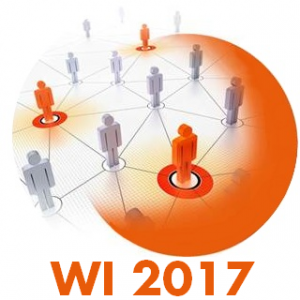 Hello Community! We proudly announce that The International Conference on Web Intelligence (WI) accepted four papers by our group. The WI takes place in Leipzig between the 23th – 26th of August. The accepted papers are:
Hello Community! We proudly announce that The International Conference on Web Intelligence (WI) accepted four papers by our group. The WI takes place in Leipzig between the 23th – 26th of August. The accepted papers are:
“An Evaluation of Models for Runtime Approximation in Link Discovery” by Kleanthi Georgala, Michael Hoffmann, and Axel-Cyrille Ngonga Ngomo.
Abstract: Time-efficient link discovery is of central importance to implement the vision of the Semantic Web. Some of the most rapid Link Discovery approaches rely internally on planning to execute link specifications. In newer works, linear models have been used to estimate the runtime the fastest planners. However, no other category of models has been studied for this purpose so far. In this paper, we study non-linear runtime estimation functions for runtime estimation. In particular, we study exponential and mixed models for the estimation of the runtimes of planners. To this end, we evaluate three different models for runtime on six datasets using 400 link specifications. We show that exponential and mixed models achieve better fits when trained but are only to be preferred in some cases. Our evaluation also shows that the use of better runtime approximation models has a positive impact on the overall execution of link specifications.
“CEDAL: Time-Efficient Detection of Erroneous Links in Large-Scale Link Repositories” by Andre Valdestilhas, Tommaso Soru and Axel-Cyrille Ngonga Ngomo.
Abstract: More than 500 million facts on the Linked Data Web are statements across knowledge bases. These links are of crucial importance for the Linked Data Web as they make a large number of tasks possible, including cross-ontology, question answering and federated queries. However, a large number of these links are erroneous and can thus lead to these applications producing absurd results. We present a time-efficient and complete approach for the detection of erroneous links for properties that are transitive. To this end, we make use of the semantics of URIs on the Data Web and combine it with an efficient graph partitioning algorithm. We then apply our algorithm to the LinkLion repository and show that we can analyze 19,200,114 links in 4.6 minutes. Our results show that at least 13% of the owl:sameAs links we considered are erroneous. In addition, our analysis of the provenance of links allows discovering agents and knowledge bases that commonly display poor linking. Our algorithm can be easily executed in parallel and on a GPU. We show that these implementations are up to two orders of magnitude faster than classical reasoners and a non-parallel implementation.
“LOG4MEX: A Library to Export Machine Learning Experiments” by Diego Esteves, Diego Moussallem, Tommaso Soru, Ciro Baron Neto, Jens Lehmann, Axel-Cyrille Ngonga Ngomo and Julio Cesar Duarte.
Abstract: A choice of the best computational solution for a particular task is increasingly reliant on experimentation. Even though experiments are often described through text, tables, and figures, their descriptions are often incomplete or confusing. Thus, researchers often have to perform lengthy web searches for reproducing and understanding the results. In order to minimize this gap, vocabularies and ontologies have been proposed for representing data mining and machine learning (ML) experiments. However, we still lack proper tools to export properly these metadata. To this end, we present an open-source library dubbed LOG4MEX which aims at supporting the scientific community to fulfill this gap.
“GENESIS – A Generic RDF Data Access Interface” by Tim Ermilov, Diego Moussallem, Ricardo Usbeck and Axel-Cyrille Ngonga Ngomo
Abstract: The availability of billions of facts represented in RDF on the Web provides novel opportunities for data discovery and access. In particular, keyword search and question answering approaches enable even lay people to access this data. However, the interpretation of the results of these systems, as well as the navigation through these results, remains challenging. In this paper, we present GENESIS, a generic RDF data access interface. GENESIS can be deployed on top of any knowledge base and search engine with minimal effort and allows for the representation of RDF data in a layperson-friendly way. This is facilitated by the modular architecture for reusable components underlying our framework. Currently, these include a generic search back-end, together with corresponding interactive user interface components based on a service for similar and related entities as well as verbalization services to bridge between RDF and natural language.
The final versions of the papers will be made available soon.
Come over to WI 2017 and enjoy the talks. More information on the program can be found here.
